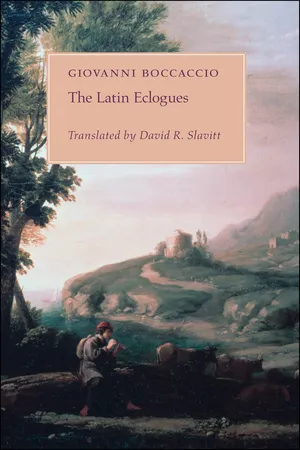
- English
- ePUB (mobile friendly)
- Available on iOS & Android
The Latin Eclogues
About this book
Giovanni Boccaccio is famous for his masterpiece The Decameron, but his Latin Eclogues are relatively unknown. David R. Slavitt's English translation makes these important pieces accessible to a new audience of readers.
Elegant and engaging, these pastoral poems address the great issues of Boccaccio's Italy, including the political and military intrigues of the day. Boccaccio modeled his poems on Petrarch's eclogues and, before him, those of Virgil and Theocritus. Slavitt's impeccable translations are highly readable, while his editorial interjections both elucidate the poet's intended meaning and frame the poems for the reader.
These charming works offer wonderful insight into daily life in Renaissance Italy. A prolific and award-winning translator, Slavitt turns the Eclogues into vibrant modern English, capturing not only the words of Boccaccio but the flavor of the original language.
The availability of The Latin Eclogues in English is a major contribution to the study of the literature and history of the Italian Renaissance.
Tools to learn more effectively

Saving Books

Keyword Search

Annotating Text

Listen to it instead
Information
Table of contents
- Cover
- Halftitle Page
- Title Page
- Copyright Page
- Dedication
- Contents
- Translator’s Preface
- I Galla
- II Pampinea
- III Faunus
- IV Dorus
- V The Falling Forest
- VI Alcestus
- VII The Quarrel
- VIII Midas
- IX Anxiety
- X The Dark Valley
- XI Pantheon
- XII Saphos
- XIII The Laurel Wreath
- XIV Olympia
- XV Phylostropos
- XVI The Messenger
Frequently asked questions
- Essential is ideal for learners and professionals who enjoy exploring a wide range of subjects. Access the Essential Library with 800,000+ trusted titles and best-sellers across business, personal growth, and the humanities. Includes unlimited reading time and Standard Read Aloud voice.
- Complete: Perfect for advanced learners and researchers needing full, unrestricted access. Unlock 1.4M+ books across hundreds of subjects, including academic and specialized titles. The Complete Plan also includes advanced features like Premium Read Aloud and Research Assistant.
Please note we cannot support devices running on iOS 13 and Android 7 or earlier. Learn more about using the app